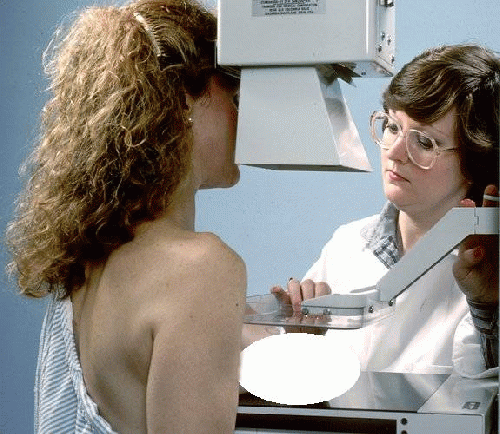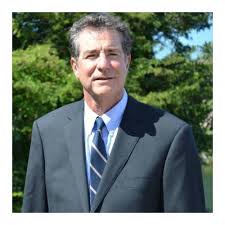
Woman undergoing a mammogram of the right breast
(Image by US National Institutes of Health - National Cancer Institute) Details DMCA
Today the LA Times and other news media reported a Danish study about the psychological toll of false-positive mammograms as if this was news.(1) Surprisingly, negative feelings arising from a false-positive mammogram can last up to three years after the event.(1) A quote from the Danish study:
"Three years after being declared free of cancer, women with false-positive results consistently reported greater negative psychosocial consequences compared with women who had normal findings."
This is not news. We have known about this since the 1980's when mammography took off as an imaging modality. The big change happened in the early 1980's when hospital radiology departments moved to Xray-film mammography. This opened the door to large-scale breast cancer-screening programs, and the false-positive mammogram was born.
I worked as a radiologist and read mammograms for thirty years, so I know that mammograms are notoriously difficult to read. The radiologist is tempted to call anything and everything "suspicious". Anything suspicious, by definition, requires a biopsy. The hospitals and the surgeons liked the extra procedures, which brought in more money to the hospital. Unfortunately the downside to these unnecessary procedures and biopsies is the psychological toll on the patient, an aspect brought out by the Danish study, and reported in the LA Times.(2)
Screening Programs Fail to Meet Expectations
Perhaps the high rate of false positives and unnecessary biopsy procedures would be tolerable if the screening-mammogram programs actually did some good. However, as Laura Esserman comments in a JAMA article, screening mammography has not lived up to expectations, and the anticipated reduction in cancer mortality has not been realized.(3) Here is a quote from her article:
"One possible explanation is that screening may be increasing the burden of low-risk cancers without significantly reducing the burden of more aggressively growing cancers and therefore not resulting in the anticipated reduction in cancer mortality." (3) Dr. Laura Esserman.
Based on my 25 years of experience reading mammograms in the hospital, I would agree with Dr. Esserman. Screening mammography has been a disappointment. This is true in my personal experience.
Mammograms Are Not Prevention
The reality is that mammograms detect breast cancer, but mammograms cannot prevent breast cancer. Animal and human studies over the last 3 decades have shown that an excellent preventive measure is iodine supplementation. Iodine deficiency increases risk for breast cancer and iodine supplementation reduces risk. So, our best tool for breast cancer prevention is Iodine supplementation, which, in actual clinical practice, works quite well. As an adjuvant treatment for breast cancer, iodine works well for that, too.
Link to original article Here
Author: Jeffrey Dach MD
Links and References:
1) http://www.annfammed.org/content/11/2/106.abstract
Ann Fam Med March/April 2013 vol. 11 no. 2 106-115
Long-Term Psychosocial Consequences of False-Positive Screening Mammography by John Brodersen, MD, GP, PhD, Research Unit and Section of General Practice Department of Public Health University of Copenhagen Øster Farimagsgade.
2) False-positive mammograms take mental toll, study finds
Women may suffer psychologically long after the scare of a false-positive mammogram, Danish researchers report. By Eryn Brown, Los Angeles Times March 18, 2013.
(Note: You can view every article as one long page if you sign up as an Advocate Member, or higher).





